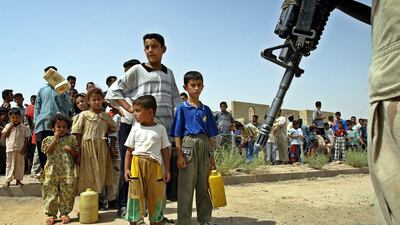More than seven million Iraqi children have difficulty accessing safe water at school 20 years after the US-led invasion and the ensuing violence left much of the country's infrastructure damaged or neglected, a UN official told The National.
Iraq's 21 million children make up nearly half of the population, but nearly half of all schools in the country do not have clean safe water. One million children are in need of humanitarian assistance and about two million are out of school, the UN children's agency Unicef said.
For years the country has faced water scarcity issues, compounded by climate change, that affects the peace and security of the region.
The invasion and ensuing violence left the country in a shambles, while corruption and mismanagement led to a slow reconstruction effort that means many schools, hospitals and other vital infrastructure is poor quality, damaged or crumbling.
This has hugely affected children.
“Fifty per cent of schools lack basic water, sanitation and hygiene services [Wash] depriving access to safe water for over 7.25 million students, 52 per cent of whom are girls,” a Unicef official told The National.
“The lack of gender-sensitive Wash facilities is one of the main drivers of girls’ school drop-out,” the official said.
About a quarter of young children are not receiving routine immunisation, said the Unicef official, adding that children going from "learning to earning" is another critical challenge.
During the past year, Iraq has been mired in political instability and protests with a focus on Baghdad and Basra that affected public investment in the social sectors and service provision for children and young people, according to Unicef.
The appointment of Prime Minister Mohammed Al Sudani brought some stability as it ended a year-long political deadlock, instability and food insecurity that heavily affected children across the country.
“It is known that 37.9 per cent of children are living in poverty, half of them suffer from two or more deprivations of basic rights,” Unicef said.
The new Iraqi government has pledged to "follow through on the commitments ... to invest in its children", said the official.
"This includes concerted efforts to reach the most disadvantaged children, including those who are out of school and those still living in camp situations," the UN official said.
Slow reconstruction efforts
Iraq must drastically improve the quality of its learning environment, its school infrastructure, facilities and quality of teaching and support for children across the country, the UN agency said.
The lack of school infrastructure is a major issue for access to education.
"High population growth, slow investment in infrastructure, as well as infrastructure damage [due to conflict] since 2013 have led to a shortage of 8,147 school buildings as of 2017-2018," the Unicef official said.
Shortages of schools in the country could be as high as 10,000 school buildings, said the official, who relied on sources from Iraq's Ministry of Education.
"Additionally, due to overcrowding, the schools are operated in multiple shifts, often 2-3 shifts per day," the official said.
The country has high levels of access to primary school education, but its lower and upper secondary education remains neglected with many challenges.
The net enrolment for children aged 12-14 years reaches, respectively, 57.5 and 33 per cent, the UN official said.
It has been reported that more girls are out of school compared with boys (9.6 per cent versus 7.2 per cent at the primary school level, 27.7 per cent versus 14.7 per cent at the lower secondary level and 46.1 per cent versus 34.8 per cent at the upper secondary level).
"Access to pre-primary education/early childhood education is extremely low, reaching only 10 per cent, meaning only 1 out of 10 children benefit from early childhood education," the official said.


